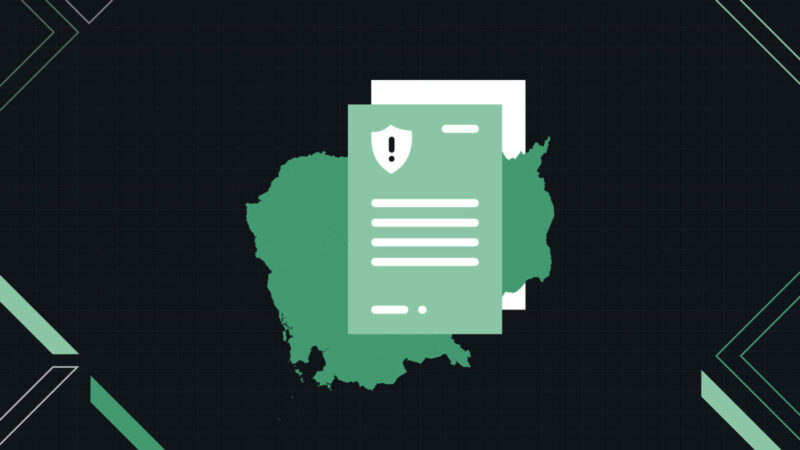This article was written with inputs from advocates working on digital rights issues that Cambodia is facing. It was originally published by EngageMedia, a non-profit media, technology, and culture organization, and an edited version is republished here as part of a content-sharing agreement with Global Voices.
As internet use and digital technologies flourished in Cambodia in recent years, more people are relying on social media and other online platforms to access news and information and to exercise their rights to free expression. However, digital rights activists, human rights defenders, journalists, and ordinary citizens are increasingly facing threats to their rights and fundamental freedoms in online spaces, being targeted by digital attacks and repressive laws introduced by the government.
Cambodia ranked 43rd out of 100 countries in the 2022 Freedom on the Net report, and 140th out of 180 countries in Reporters Without Borders’ 2022 Press Freedom Index. Freedom House noted that internet users often face arrest for their online activity, facilitating a climate of fear and self-censorship. The government, dominated by Prime Minister Hun Sen and the Cambodian People’s Party, has not been friendly to critical expression, often putting pressure on the opposition and media, and engaging in politically-motivated persecution and harassment.
Problematic laws
The enactment of problematic laws in Cambodia is stifling free expression and posing threats to the security and privacy of activists, independent media, and ordinary citizens. On March 19, 2021, during the COVID-19 pandemic, the Cambodian government adopted a Sub-decree on the Establishment of the National Internet Gateway (NIG), which would centralise internet traffic within their jurisdiction. Article 6 of the Sub-decree allows the blocking of online connections or content deemed to “affect safety, national revenue, social order, dignity, culture, traditions, and customs,” without further elaboration on what these elements entail. This provision and the lack of its limitations enable authorities to block or restrict content and increase their ability to conduct surveillance.
While not yet implemented, the sub-decree would infringe on the right to freedom of expression guaranteed by Article 41 of the Cambodian Constitution, as well as Article 31, which recognises and respects human rights as stipulated in international law. Human rights defenders and digital rights advocates have criticised the sub-decree and called on the government to scrap the NIG. In a statement, 32 organisations said:
While the exact technical infrastructure and how it will be operated is still unknown, there is little doubt the NIG’s true purpose is to enable the Cambodian government to tighten the noose on what remains of internet freedom in the country.
Such provisions would reinforce a culture of self-censorship, forcing online activists and the media to be more careful in producing critical content to avoid threats, prosecution, or the possible revocation — or even shutdown — of their media outlets.
In 2015, Cambodia adopted the Law on Telecommunications as part of the government’s efforts to strengthen and expand critical digital infrastructure development. However, the law has problematic provisions, such as excessive powers of surveillance given to authorities and the criminalisation of freedom of expression.
For instance, Article 97 permits covert listening and recording of dialogue using any telecommunications system with the approval of a “legitimate authority,” but does not specify what constitutes a “legitimate authority,” leaving the door open to arbitrary interpretation and the law being used for politically-motivated reasons.
Meanwhile, the law’s relevant prakas (official declarations) have been used to regulate or block content, as in the case in 2018 when internet service providers were ordered to block the services of 15 independent media outlets or news websites.
Aside from threatening Cambodians’ digital rights, it should be noted that these laws also go against the international agreements that the Cambodian government ratified such as the Universal Declaration for Human Rights, International Covenant on Civil and Political Rights, and the ASEAN Charter, thus infringing their international obligations and responsibilities to uphold human rights as set out by these agreements.
Restricting access to information
Most people rely on Facebook for information, but the social media platform has recently been in hot water with Hun Sen and the government. In January, the prime minister gave a speech threatening opposition leaders, which was broadcasted through his Facebook page. Critics called for the video to be taken down, citing Meta’s rules on incitement to violence. The case was sent to Meta’s Oversight Board, which recently decided that the video should be taken down and recommended that the prime minister be suspended from Facebook’s platforms. In response, the government has threatened to block Facebook and barred Oversight Board members from entering the country.
The government’s retaliatory actions are in line with its previous moves to restrict access to information by blocking websites or ordering the shutdown of critical media. In February, the government ordered the shutdown of Voice of Democracy, one of the country’s last remaining independent news organisations. This follows a series of shutdowns over the years, including the Cambodia Daily in 2017 and over 30 independent radio stations. To avoid being targeted by government authorities, journalists may be more cautious or self-censor their reporting on public interest issues.
Moving forward
In January 2022, civil society groups convened the Digital Rights Working Group (DRWG) to tackle digital rights and internet freedom in Cambodia. The group analyses and monitors the government’s control over the flow of information on online platforms, its imposition of aggressive cyber-policing, the blocking of websites and associated social media accounts, and increasing online surveillance.
Multi-stakeholder cooperation is important to tackle the concerning digital rights violations in Cambodia. The DRWG’s role is critical as it works with the regional and international community and connects with various stakeholders to explore ways to further protect and promote digital rights. It is also important for the international community to have open dialogues with the government on digital rights issues to ensure that enacted policies do not restrict and infringe on digital rights.




